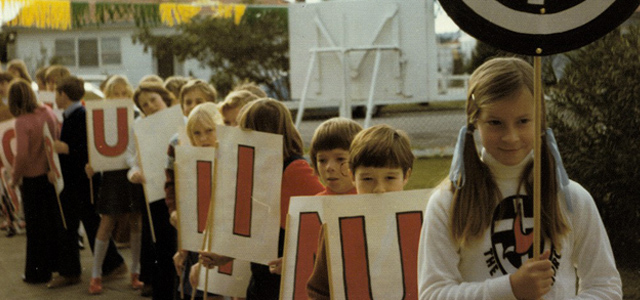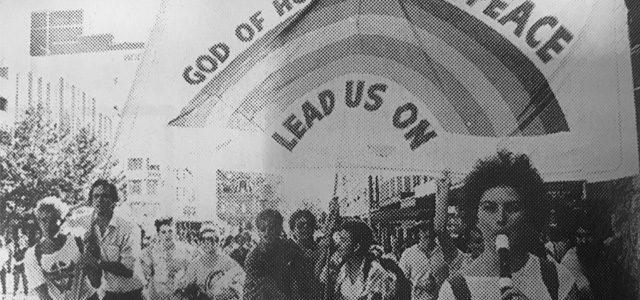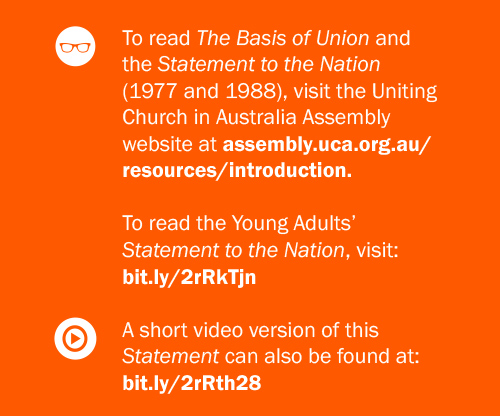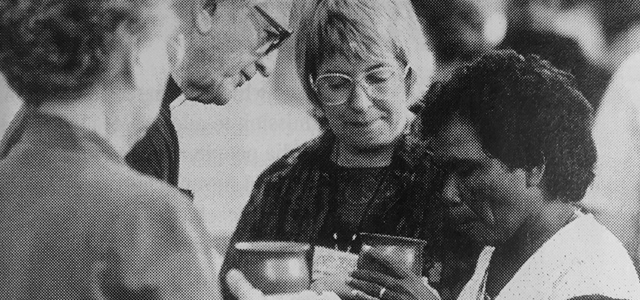Many years of prayer and hard work culminated on 22 June 1977 when three denominations (Congregational, Methodist, and Presbyterian) came together. Rev. Dr John Squires, director of Education and Formation at the Uniting Church WA, celebrates this union and explores some of the Uniting Church’s founding documents.
The Congregational, Methodist and Presbyterian Churches joined together as one Uniting Church in response to the prayer of Jesus, which is reported biblically in John 17:21 — “May they be one.” There, Jesus prays for his earliest disciples, and for those followers who come after them, “that they may become completely one, so that the world may know that you have sent me and have loved them even as you have loved me.” (John 17:23)
The unity of the church gives expression to this final prayer of Jesus and bears witness, to all people, of God’s love for the world.
This prayer is also important for the international ecumenical movement around the world. Not only was the Uniting Church formed in Australia in 1977, but last century also saw the formation of the United Church of Canada (1925), the Church of South India (1947), the Church of North India (1970), the Church of Pakistan (1970) and the United Reformed Church in the UK (1972).
The worldwide umbrella organisation for churches, the World Council of Churches (WCC), was formed in 1948, and this body includes churches from the Anglican Communion, many Orthodox churches, the Lutheran Church and many other Protestant Churches (including the Uniting Church). The Roman Catholic Church is not an official member, but sends observers to each meeting of the WCC.
One body, one Spirit, one Lord
These churches seek to live out the principle that is stated in the letter to the Ephesians: “There is one body and one Spirit, just as you were called to the one hope of your calling, one Lord, one faith, one baptism, one God and Father of all.” (Eph 2:4-5)
Another biblical text that is important to the Uniting Church, and the international ecumenical movement, is the radical claim made by Paul in his letter to the church in Galatia. Paul states that for those who are baptised into Christ, “there is no longer Jew or Greek, there is no longer slave or free, there is no longer male and female; for all of you are one in Christ Jesus.” (Galatians 3:28)
This verse can be applied to the Church – to those who are ‘in Christ’ because they have been baptised. But it can also offer us a Christian vision for society as a whole – relating to everyone in creation as those who are ‘in Christ’ because they are the people whom God loves and values.
Over the 40 years of its existence, the Uniting Church has sought to take these words very seriously in the way that it lives in society. The Church is committed to take action to support people who are experiencing discrimination on the basis of one of more of the factors identified by Paul — ethnicity, class, or gender — as well as from other causes.
The Uniting Church has always been committed to working to ensure that noticing what makes people different does not lead to stereotyping or discrimination, especially for those who are particularly vulnerable in our community.
Building our foundations
The foundation of the Uniting Church was formed on a document known as The Basis of Union, which set forth our primary values and commitments. It also describes our structure and ways of operating. At the same time as The Basis of Untion’s release, the UCA’s First Assembly (in 1977) issued a Statement to the Nation. This set forth our commitment to the kind of society which was described by Paul in Galatians 3.
In this Statement, the Church declared that “our response to the Christian gospel will continue to involve us in social and national affairs.”
And so, it decreed that it was eager “to uphold basic Christian values and principles” in society. It then identified some of these values: “The importance of every human being, the need for integrity in public life, the proclamation of truth and justice, the rights for each citizen to participate in decision-making in the community, religious liberty and personal dignity, and a concern for the welfare of the whole human race.”
Accordingly, the Uniting Church pledged itself to action which would “seek the correction of injustices wherever they occur.” The statement specifically identified “poverty and racism, equal educational opportunities, adequate health care, freedom of speech, employment or dignity in unemployment” as key areas in which it would seek “to oppose all forms of discrimination which infringe basic rights and freedoms.”
That is quite a list.
The Statement also challenged some values which were felt to be overly important in society, especially acquisitiveness and greed (including the daily widening gap between the rich and poor), and challenges to basic human rights. These still remain as pressing issues in 2017.
A prophetic paragraph in the 1977 Statement highlighted the Church’s strong commitment to environmental responsibility. In the Statement, the UCA affirmed that it “will urge the wise use of energy, the protection of the environment and the replenishment of the earth’s resources for their use and enjoyment.”
Back then, that was pioneering. Now, every denomination places ecological concerns at the heart of its faith.
Recognising injustices inflicted on Australia’s First Peoples
The 1977 Statement offered a bold affirmation of the right of a faith community to propose policies and lobby for actions which would further the welfare of all persons everywhere. But one striking area of social and national policy and action is not to be found in this Statement.
Curiously, there is a reference to the reality that we live within the region of South-East Asia and the Pacific. However, there was no specific reference at all to the original Indigenous inhabitants of Australia — the First Peoples, those Aboriginal and Islander people who had cared for the land of this continent, the islands nearby, and the seas which surround it, for millennia.
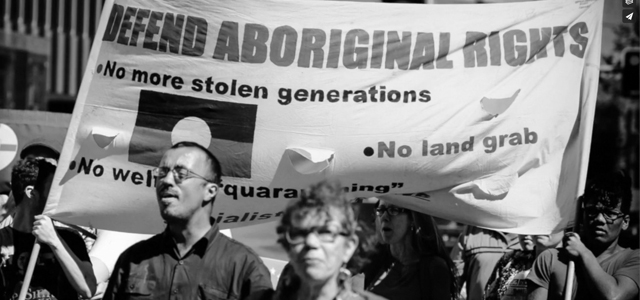 So, in 1988, the year which commemorated the bicentenary of the first European settlement of Australia, the Uniting Church issued a further Statement to the Nation, which made explicit and detailed reference to First Peoples.
So, in 1988, the year which commemorated the bicentenary of the first European settlement of Australia, the Uniting Church issued a further Statement to the Nation, which made explicit and detailed reference to First Peoples.
This document was promulgated at the meeting of the 5th Triennial Assembly.This second Statement included words of confession and commitment.
There was a very clear confession of “the injustices that have been inflicted on those of us who were Aboriginal people” as well as a commitment to “legislative action which honours the Aboriginal plea for justice… and popular action by which the Australian people express their willingness to support Aboriginal Australians in the quest for justice and their struggle to reconstruct their society.” Sadly, these commitments remain unfulfilled; they remain as pressing and urgent matters in our own time.
Youth Push
The 1988 Statement went on to underline the commitments made to particular issues in the 1977 Statement, including action “to work for justice and peace… challenging acquisitiveness and greed, opposing discrimination and prejudice, condemning violence and oppression, and an intention to challenge all social and political structures and all human attitudes which perpetuate and compound poverty.” That, too, remains a matter about which we can continue to be concerned.
The 1988 Statement strengthened the affirmations of the earlier document, concerning the natural world as God’s creation. It affirmed that the world is “good in God’s eyes, good in itself, and good in sustaining human life”; it offered a commitment “to promote the responsible management, use and occupation of the earth by human societies… [and] to challenge all structures and attitudes which perpetuate and compound the destruction of creation.”
In 2012, after time spent at the church’s National Young Adult Leaders’ Conference (NYALC), young adult leaders of the Uniting Church in Australia wrote a further Statement to the Nation.
With themes developed from earlier Assembly documents, the young adults issued a direct challenge for “our church, our government and our nation to listen deeply to the knowledge and culture of our First Peoples.”
They asserted that “continued displacement and oppression of the Indigenous people of Australia must stop” and advocated for recognition of Indigenous people in the Australian Constitution.
The same statement developed the ecological concerns of the earlier documents, by noting: “We are upset at the misuse of the natural environment for greed and consumerism and the lack of compassion toward those affected”. They advocated for “investment in renewable energy” and endeavoured “to make responsible, ethical decisions in our day to day living.”
Their Statement to the Nation ended with a commitment “to work towards God’s promised goal of the reconciliation of all things by working for justice and for peace in our nation and beyond.”
In 1977, the Assembly concluded its Statement to the Nation by pledging the Church “to hope and work for a nation whose goals are not guided by self-interest alone, but by concern for the family of the One God — the God made known in Jesus of Nazareth, the One who gave His life for others.”
A similar sentiment occurs at the conclusion of the 1988 Statement: “As a Christian church, born out of the struggles of Australian Christians to live in obedience to God in Australia, we find hope in Jesus Christ.”
“We recognise that we Australian people are of diverse faiths and cultures and our desire is that we live together here in one community in justice, peace and mutual respect.”
May that still be the case for the Uniting Church in Australia in 2017.
Rev. Dr John Squires is the director of Education and Formation at the Uniting Church WA



